The beauty and brutality of life in the shadow of Kashmir killings
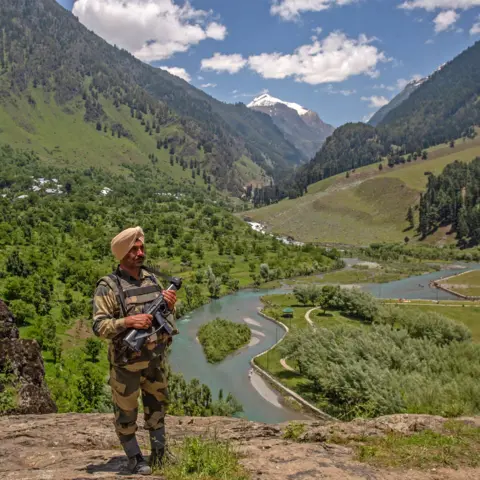 Abid Bhat/BBC
Abid Bhat/BBCA centuries-old Persian couplet often repeated in Indian-administered Kashmir translates to: "If there is a paradise on earth, it is here, it is here, it is here." And many Kashmiris insist it was written with Pahalgam in mind.
The small town, nestled between tall Himalayan mountains with a gurgling Lidder River flowing through it, is called the mini-Switzerland of India.
The valleys and meadows here have long provided stunning locations for Bollywood romances and attracted tens of thousands of tourists escaping the heat and dust of Indian planes.
But on 22 April, the tranquil valley hit global headlines when a sprawling meadow here turned into killing fields.
Militants singled out male Hindu tourists and murdered 25 of them in front of their families in Baisaran, a beauty spot about 7km from the town. A local Muslim pony handler who tried to help tourists was also shot dead.
The massacre brought nuclear-armed India and Pakistan to the brink of war. India blamed Pakistan for the killings – an accusation Islamabad denied – and the two countries attacked each other with missiles and drones over four days in May after which a fragile truce was agreed.
But in Pahalgam, time seems to have slowed down and the residents are trying to pick up the pieces and move on.
When I recently visited Pahalgam, where a large majority makes a living through tourism, I found a land and its people trying to deal with the collective trauma, mourning the loss of lives - and livelihoods. The peak tourist season here is April to June - and this year, most of it has already been lost.
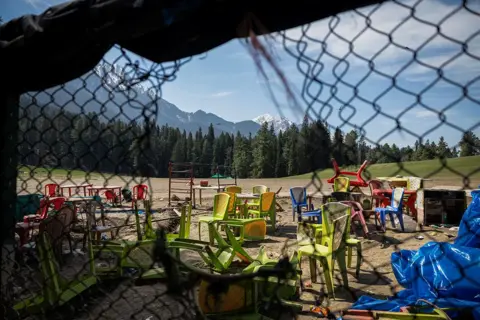 REUTERS/Adnan Abidi
REUTERS/Adnan Abidi"What happened here is condemnable… an inhuman act. Innocent people were killed," says Javeed Burza, president of Pahalgam Hotels and Restaurants association.
Standing in the rear lawns of his hotel, he watches the Lidder roar past. On the other side are huge mountains covered by a thick carpet of trees. It's this sort of view that made this valley in south Kashmir such a sought-after destination.
Mr Burza says visitors came from all over India for its lakes, forests, meadows and glaciers – and went back raving about the local people and their hospitality.
"People here are poor, they live hand-to-mouth, but they are known to be very kind and helpful. Now we are all facing the consequences of this senseless violence," he adds. "We had bookings right until the end of June. But then everything fell apart like a pack of cards. There's not much left here now."
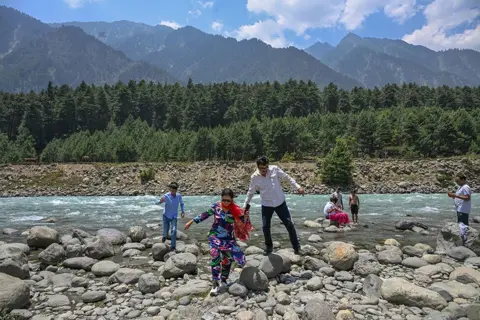 Abid Bhat/BBC
Abid Bhat/BBCThe region's Chief Minister Omar Abdullah says in the immediate aftermath of the attack, tourists fled the town and people who were proposing to come cancelled.
To persuade tourists to give Pahalgam another chance, he visited the town within weeks of the attack, held a cabinet meeting there and, ignoring advice of security officials, cycled through the streets.
For Mr Abdullah, Pahalgam's wellbeing is personal.
"It's where our school picnics were; it's where we probably first dipped our toes in running water. For some of us it's the first time we went white water rafting or trout fishing. For others, it's a day or overnight visit. For us, it's part of our growing up."
Mr Abdullah says it's always hard to make predictions but he hopes to see Pahalgam "where it was on 21 April this year".
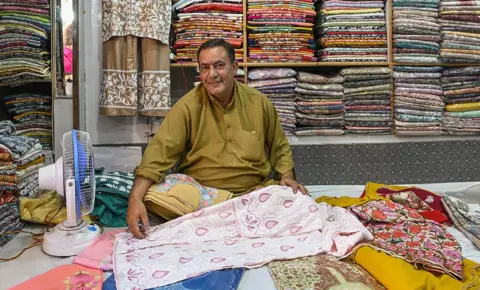 Abid Bhat/BBC
Abid Bhat/BBCOn that day, it was packed with tourists, says Fayyaz Ahmad, who sells Kashmiri embroidered shawls and dresses in Pahalgam's main market, with shops lining both sides of the only road that passes through the town.
Many remain shuttered, but a few have begun to open in the hope of attracting customers. The day I met him was the first he'd opened his shop since the killings.
The last three seasons – post-Covid years – had been marked by bumper visits, Mr Ahmad says.
"Every morning at least 3,000 cars would arrive by 11am. There would be traffic jams lasting two-three hours. Many tourists would say they couldn't find accommodation."
His own shop sometimes got so crowded that a queue of shoppers would form outside. "Business was brisk," he said. But now he's had to let three salesmen go. They would be rehired only if business picked up, he said.
The targeting of tourists has left him bewildered. Since 1989, when an anti-India militancy gripped Kashmir valley, Mr Ahmad says, "the situation was really bad here".
"We were afraid to step out of our homes, but tourists who chose to come here were never harmed. We can't understand why they've been targeted now. Who could do such a thing?" he asks.
India blamed Pakistan-backed militants for the massacre in a region that both countries claim in full, but control only in parts.
Delhi accuses its neighbour of fuelling a long-running insurgency that has killed tens of thousands in Indian-administered Kashmir. Islamabad has long denied backing militants there.
In recent years, the insurgency had abated, bringing millions of tourists and a growing sense that the region was finally becoming safer. But that has now changed.
"Pahalgam ke naam par dhabba lag gaya [Pahalgam's name is stained]," laments Nisar Ali, an 80-year-old resident who makes a living by selling papier mache products.
"People had taken loans to open shops and buy taxis, now everyone is staring at an uncertain future. What's happened to our paradise," he asks.
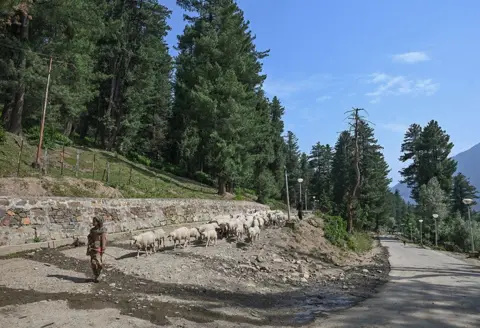 Abid Bhat/BBC
Abid Bhat/BBCJust 2km from the market, a signboard points to the untarred road that goes up to Baisaran, a 5km trek covered on foot or ponies. The concertina wire used to barricade the road has been moved to one side and local people and flocks of sheep can be seen making their way down.
Before the killings, it was one of the most popular places for tourists. The meadow offering a great view of the valley was open from 08:00 to 17:00 and would get thousands of visitors daily in the summer.
But it remains out of bounds now. Two men have been arrested for allegedly providing shelter to the militants, but those who carried out the killings have still not been caught - leading to fears that they could return.
Abdul Wahid Wani, the president of Pahalgam pony owners' union, who was the first to arrive at the scene, says 1,090 tourists had gone up to the meadow until 14:00.
At the time of the attack, there were about 300 tourists in Baisaran, he estimates.
At 14:36, he says, he received a call from the police asking him if he had heard anything about an incident at Baisaran.
"I tried calling colleagues who had taken tourists up to the meadow, but no-one answered. I figured something was wrong and my brother and I ran all the way up and reached there at 15:10."
The police and paramilitaries arrived 15 minutes later. That night, Mr Wani, wrapped up at 02:30. He says what he saw there keeps him awake at nights.
"I saw women and children crying and screaming. I saw bodies on the ground. I saw 10-15 people injured."
In the first videos of the aftermath that went viral on the day of the attack, Mr Wani can be heard trying to reassure the survivors, offering them water, telling them he was there to help.
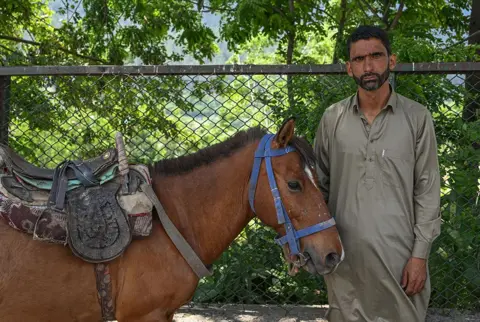 Abid Bhat/BBC
Abid Bhat/BBCHe summoned other pony handlers who arrived at the scene to help evacuate people - "carrying them down on our backs and wooden cots" - and gather bodies strewn about the vast field.
"I still can't forget what I saw that day. I panicked; I had palpitations. I'd never seen anything like that before."
When I met him in Pahalgam, he looked tired, his eyes sunk deep into his lined face.
"For many nights I couldn't sleep and sleep still eludes me. With the militants still on the loose, I worry what will happen if they come after us because we helped people they were trying to kill?"
But earlier this week, we exchanged messages and he sounded more optimistic.
The town has sprung back to life, with thousands of pilgrims arriving to take part in Amarnath Yatra - the annual Hindu pilgrimage to the Amarnath cave shrine. It began on 3 July and will go on until 9 August.
Dozens of camps have been set up and thousands of police and security forces have been deployed along the route to ensure security.
Pahalgam is one of the two starting points for the trek to the shrine – and as many pilgrims hire ponies to take them part of the way, there's a steady stream of work for Mr Wani and his colleagues.
But hoteliers and shop-owners say they will have to wait for their turn until after the end of the pilgrimage since most pilgrims stay in cheaper camps and rarely purchase crafts.
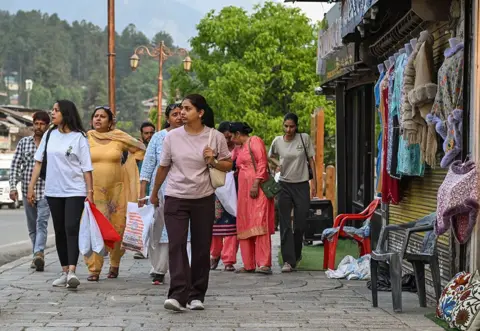 Abid Bhat/BBC
Abid Bhat/BBCBut many are taking heart from the fact that tourists have begun returning to the region. Ravi Gosain, president of All India Tour Operators, says in June, 40% of more than 45,000 tourists who visited the Kashmir Valley went to Pahalgam.
On the day I visited, there were families stopping for photographs under a "Love Pahalgam" sign.
Shabiba and Hamid Jaffar, who had visited last year around the same time, said it was so crowded then that they had to wait for half an hour to be able to take a photo here.
"When we decided to come this year, our friends tried to discourage us saying it's not safe," says Shabiba. "But it's totally safe and my children are so happy that they are saying let's move to Kashmir."
Mr Jaffar says their friends are calling them after seeing their photos. "And I'm telling them to come here for a holiday. Where will you see this beauty? Where will you get this peace?"
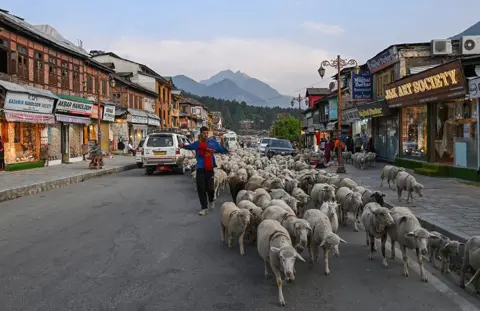 Abid Bhat/BBC
Abid Bhat/BBC